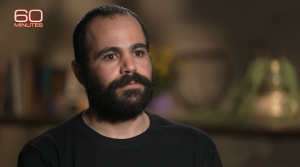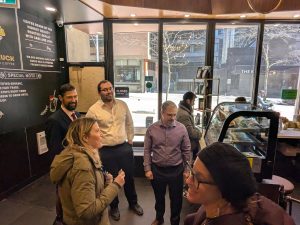A new public art project in Hamilton, Ont., will honour Holocaust hero Raoul Wallenberg.
Entitled be:longings, the sculpture by a trio of local artists was selected from 44 submissions. It will take viewers on a journey along a gravel path past 10 bronze-cast suitcases. The casts, of various styles and sizes, will draw viewers to a living tree growing out of a final piece in a central garden.
Since 2010 Hamilton’s public art program has received over 274 artist proposals, consulted with over 6,416 members of the public and commissioned 19 works.
Artist, writer and poet Gary Barwin conceived the project as a way to represent the baggage people carry through their lives.
“These represent the emotional baggage you bring with you as well as the history of Canada that is about escape and travel,” he said in an interview. “One of the suitcases will be a smaller thing that represents the use of documents, of civil infrastructure that helps people escape, and Wallenberg is certainly a major figure in that, along with others who used their positions as diplomats to help people.”
A city news release announcing the award of the $200,000 art project said the tree at the centre of the display “represents strength, hope and the overcoming of obstacles, as it pushes through that which contains, obstructs and controls its capacity to thrive.”
The ultimate aim of the project, it continued, is “to inspire visitors to reflect on what human rights are, and how – despite the trials of history and oppression – humanity and its ideals are ultimately hopeful, inextinguishable and irrepressible.”
Barwin, with partners Simon Frank and Tor Lukasik-Foss, were awarded the project in May by a volunteer jury of citizens, artists and project stakeholders. Artists entering the competition were asked for projects “that will speak to themes related to human rights and the legacy of great humanitarians such as Raoul Wallenberg, who saved over 100,000 Jews from the Holocaust.”
The jurors felt that in addition to speaking to themes of universal migration, it most effectively met the goals of interactivity and self-reflection, “as it invites park visitors to investigate each piece as they journey along the pathway, revealing itself over time.” They also decided the project was most responsive to the natural character of the park and nearby forest.
Barwin, the author of the award-winning Yiddish for Pirates, has written 21 books of poetry, fiction and works for children. He is also a composer and musician. His family wandered the world looking for a place to live without prejudice – passing from eastern Europe to South Africa and Northern Ireland, before finding what they sought in Canada.
In an interview, Barwin said the political message of a work about the experience of migrants is implicit, recalling Canada’s reputation as a land of safety and opportunity.
“The pre-existing statement was that since the ’60s Canada is a place that has seen itself as a refuge for immigrants and refugees and understanding multiculturalism as core to our identity,” he said. “The current political swing to xenophobia means we have to reassert these values.
“I’m glad that this is coming at this time because everything that we can do to reassert inclusivity is important,” he added. “It reminds us that we always have to be vigilant about basic rights and decency in politics because it’s too easy for these kinds of corrupting forces to seek people’s weakest sides and exploit them for political gain.”
Wallenberg, who was born in Sweden and educated in the U.S., was recruited by the U.S. War Refugee Board in 1944 and sent to Hungary, where, as a Swedish diplomat, he worked to assist Hungarian Jews. When Budapest was liberated by Soviet forces in February 1945, more than 100,000 Jews remained, largely as a result of his efforts.
Last seen in the company of Soviet officials on Jan. 17, 1945, Wallenberg disappeared. Sweden declared him officially dead in October 2016.
The be:longings project is expected to be in place next year. The team is currently designing its specific features after which a foundry will be chosen to cast the bronze pieces.






